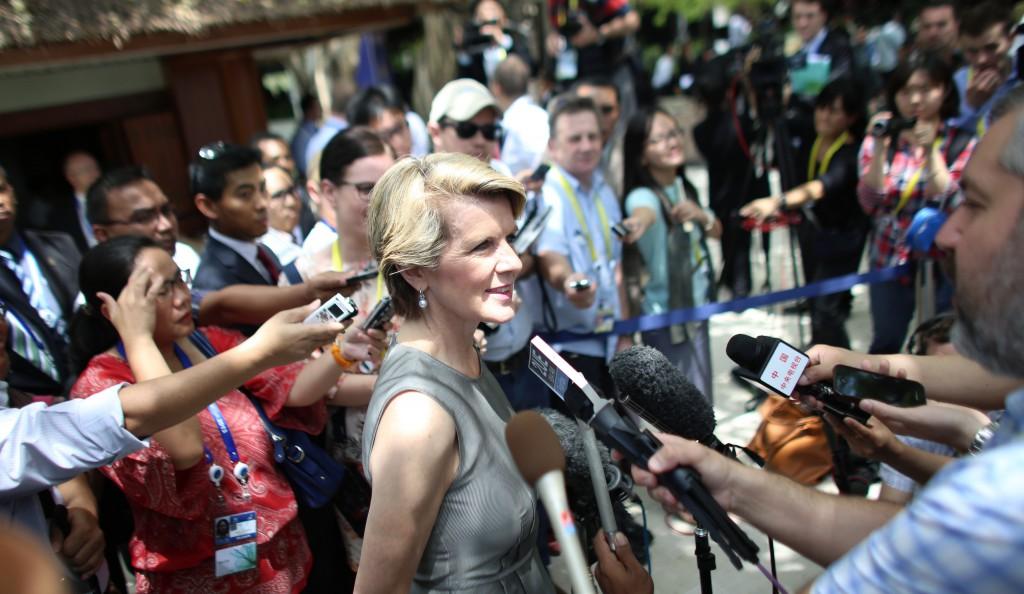One of the things that any new Minister for Foreign Affairs has to decide is where to focus his or her attention within an extensive portfolio. Foreign affairs spans a wide field including security, prosperity, international order and international aid.
Some past ministers have seemingly decided to cast themselves as ‘Minister for International Cooperation’, focusing their attention on the UN and multilateral institutions, while others have aligned closely with their defence counterpart, positioning themselves as ‘Minister for International Security’. In one case, Prime Minister Rudd acted like his own minister for foreign affairs, leaving the unlucky Stephen Smith as essentially ‘Minister for Whatever the Prime Minister Isn’t That Interested In’.
In Julie Bishop’s case, her first six months suggest that she’s focusing her energy as ‘Minister for Economic Diplomacy’, aligning her role closely with the efforts of the Minister for Trade and Investment and the government’s economic agenda.
Analysing Bishop’s first six months through her published speeches—43 in that period—gives a revealing insight into her key preoccupations. ‘Economic diplomacy’ is one of the most frequently-used phrases in her speeches and appears as a regular reference point. The Minister defines putting economic diplomacy first as utilising international assets to promote Australia’s economic prosperity. That includes focusing on economic reform and trade liberalisation, supporting open trade, pursuing an ambitious free trade agenda, supporting a vibrant business sector at home and abroad and working for closer ties to Asia.
While a concern for economics isn’t new—trade has always been a key concern for Australian foreign policy—the level of emphasis is distinctive. At a time when there are also a number of security issues in the region, it’s striking that most of the Minister’s discussion of Australia’s relationships in Asia is framed primarily in terms of trade.
Certainly, when telling the story of Australia’s relationships in the region—with Japan, China or Korea—trade comes first. In her speeches describing our relationships in Asia the Minister appears to sequence Australia’s three foreign policy priorities in this way: trade, then security cooperation, then working for a rules-based international order.
This could be part of a wider view on the relationship between economics and security. In other contexts, the Minister speaks about the role of greater economic prosperity not just as an end in itself but also as vital for regional as well as global peace and security.
The exception to this is the Minister’s speeches on the US: here it’s clear the security relationship comes first. The Minister has a keen understanding of the Australia–US alliance and considers it ‘the indispensable feature of Australia’s strategic and security arrangements’. She pays tribute to both countries’ shared history, restating the Coalition’s traditional position on ANZUS as the ‘central, vitally important truth which underpins Australia’s foreign policy’. This isn’t to say that there isn’t also a trade agenda—the Minister notes that the US-led Trans Pacific Partnership ‘has the potential to deliver a major boost to trade and investment in the region’—but it’s clearly subsidiary to the security alliance.
Of course the Minister does focus on security issues where relevant, for example in speeches on cyberspace or humanitarianism. And in speeches to the United Nations, security issues are clearly a focus as part of Australia’s term on the Security Council. Minister Bishop spent her first week in office on issues such as preventing sexual violence in conflict, the security situation in Yemen and chairing the UN Security Council’s session on small arms and light weapons. However, Minister Bishop’s speech to the General Assembly draws heavily on the role of economic development in contributing to security and outlines Australia’s role in advancing international trade liberalisation and economic growth as contributions to security.
A good example of the Minister’s priorities is her speech chairing the newly-renamed Indian Ocean Rim Association (IORA) at its meeting in Perth. The Minister expresses her wish for both stability and prosperity for the region; but beyond a brief mention of piracy and maritime security, she focuses on ways to cooperate for the ‘peaceful, sustainable use of this magnificent ocean‘ as set out in the Perth Principles. She notes her particular interest on issues of women’s economic empowerment and educational exchanges and outlines the Government’s New Colombo Plan to build educational and people-to-people links in the region.
Through these speeches a portrait emerges of a minister clearly focused on economic diplomacy as the enabler for strengthening international relationships and contributing to peace and security. From her first six months of speeches, we can expect a minister with a keen consideration of Australia’s economic interests and the focus and determination to pursue these. In other words, the Defence Minister need not be worried about his patch.
Melissa Conley Tyler is national executive director of the Australian Institute of International Affairs and Doris McDonald-Seaton is a research intern at the Australian Institute of International Affairs. Photo courtesy of DFAT.
